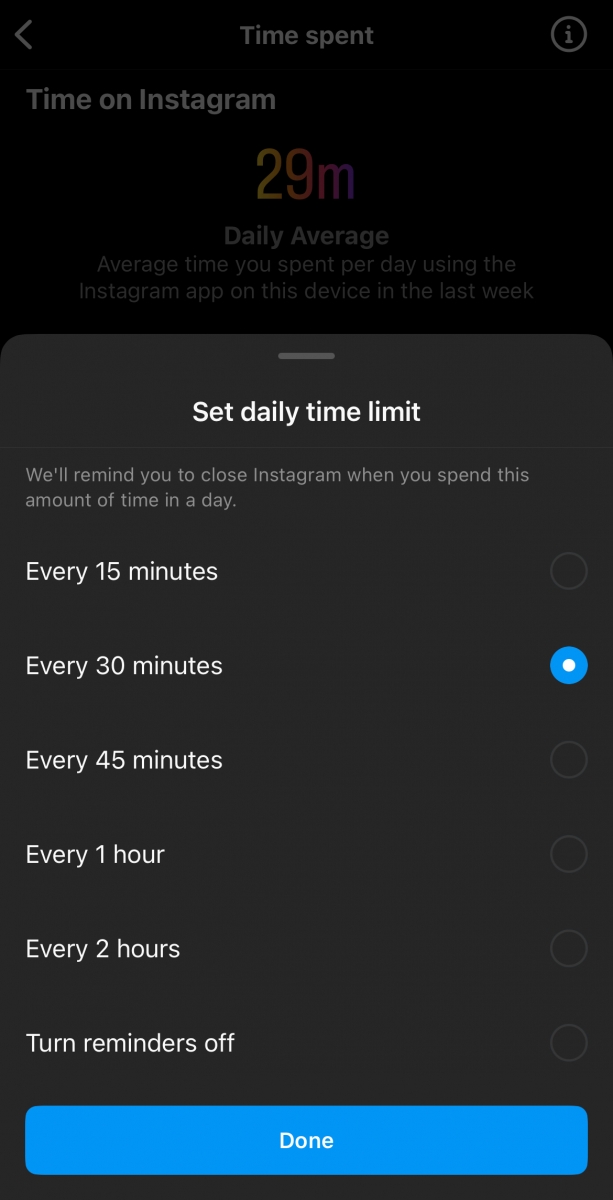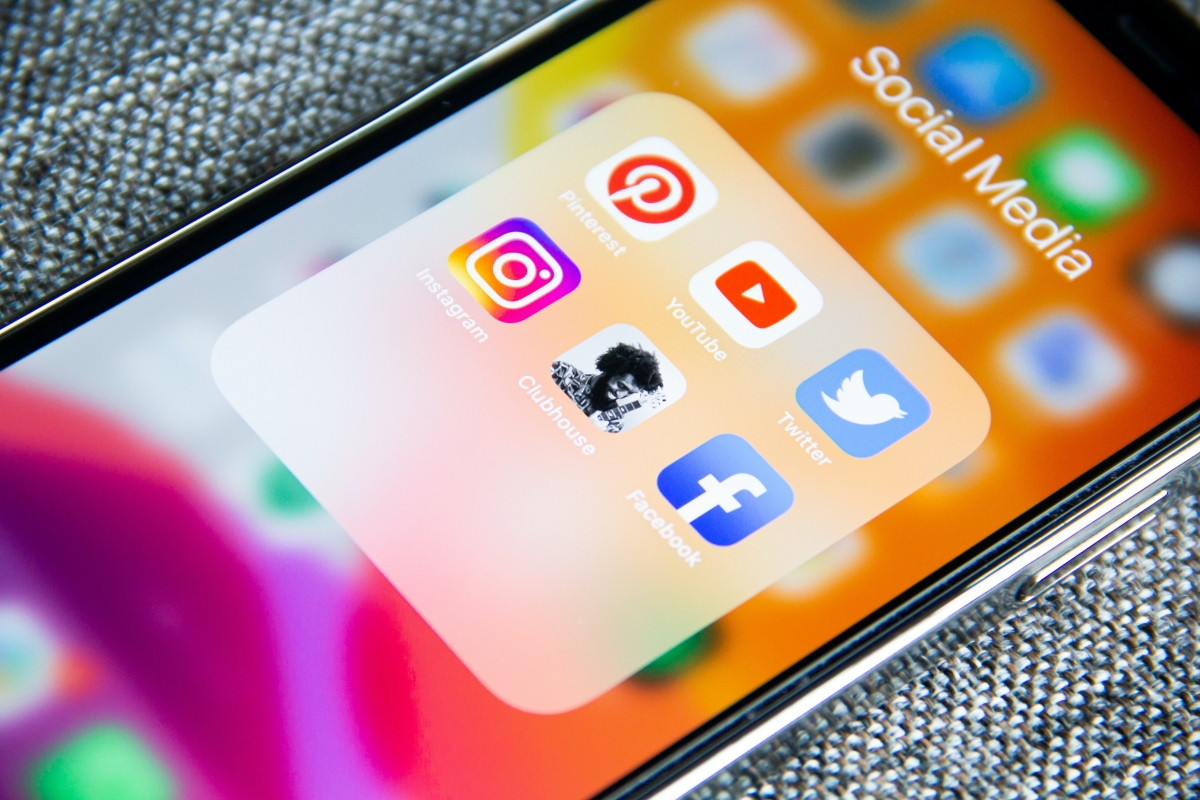Self-care in the digital age: How we can handle social media in a healthy way
Editorial Assistants: Chenhao Zhou and Maren Giersiepen.
Note: An earlier version of this article has been published in the German version of In-Mind.
Do you find it difficult to reduce the time you spend on social media in the long term? Are you interested in learning why you often use social media excessively and what negative effects this can have on you? Here, you'll not only find answers but also practical strategies to protect your mental health, helping you achieve a balanced approach to social media use.
Healthy Use of Social Media
Dive into the impact of social media and get practical tips for avoiding excessive use of social media and protecting your mental health.
It’s Monday night, 1:00 AM – once again, way too late. You had planned to be in bed and asleep by now, so you could be well-rested for the upcoming exam tomorrow. But once again, you’ve lost track of time and have been endlessly scrolling through content on TikTok and other platforms. You check the likes on your posts and look at the numerous new entries from your followers. Unfortunately, this is not a one-time occurrence. Despite the negative effects on your health and performance, you can’t seem to reduce the time you spend on social media. Completely avoiding it isn’t an option either, as that would lead to social isolation.
In today’s world, social media platforms like Instagram, TikTok, Facebook, and others have taken on an increasingly significant role in our everyday lives. They allow us to effortlessly communicate with others, share content, get inspired, and expand our social networks. While the benefits and opportunities of these platforms are undeniable, their potential negative effects on our mental health are also being intensively discussed in both popular and scientific circles.
This article summarizes the possible negative consequences of social media use on our mental health. Additionally, we'll explore the causes of excessive social media use and discuss strategies for protecting mental health. By engaging with this topic as a social media user, you can adopt a more mindful approach and, in the spirit of self-care, ensure that your apps don’t negatively impact your well-being.
How does the use of social media affect mental health?
Excessive use of social media can negatively affect your mental health and performance in various ways. Constant connectivity and the pressure to always be online can cause stress. Additionally, excessive use of social media increases the likelihood of experiencing anxiety, feeling down, or even developing depression [1]. Spending too much time on social media before bed can lead to sleep deprivation and poor sleep quality. The constant light from screens disrupts the natural sleep-wake cycle and can lead to difficulties falling asleep by inhibiting the release of the sleep hormone melatonin [2]. Excessive use can also negatively affect your professional and academic performance [3]. Your personal relationships may suffer as well. If you focus primarily on virtual interactions, it may cause you to withdraw from social situations and neglect personal relationships [4]. The constant pursuit of likes and positive feedback can lead to negative emotions when you can't keep up with others or when the expected validation is absent. Receiving a lot of "hates" on social media, such as insulting, demeaning, or hostile comments or messages, can have a hurtful or negative impact. This can lead to a negative self-image and reduced self-esteem, which harms your mental health [5]. Have you ever wondered if you might even be "addicted" to social media? Officially, there is no diagnosis for " social media addiction." Therefore, it is more accurate to speak of addictive-like behavior or a "use disorder." Many studies focus intensively on understanding the parallels between substance addiction, such as alcohol or nicotine, and certain excessively performed behaviors, such as excessive smartphone use, which often includes the overuse of social media [6].
How Can Excessive Use of Social Media Be Explained?
We will now explore the potential causes of excessive social media use. As social beings, we have an inherent need to connect, communicate, and interact with others. The fulfillment of these social needs contributes positively to our psychological well-being. Consequently, our behavior is significantly influenced by these needs and fulfilling them acts as a reward. A strong desire for social connection can, therefore, drive excessive social media use as individuals seek for social validation and reward.
The need for social belonging refers to the desire to connect with others, build relationships, and be accepted and recognized in social groups. Social networks allow you to satisfy your need for social belonging and experience a sense of community and support. Social media enable communication with friends, family, and a wide online community 24/7. Unlike real-life relationships, this often requires less effort and allows for faster interaction, thus providing immediate rewards.
The need for recognition can also be fulfilled through social media use. Social media provide a platform to present oneself, share successes, and receive validation from others. Likes, follower counts, and positive comments can boost self-esteem as they give us approval [7]. On the other hand, there may also be pressure to constantly post perfect content and show our best side to gain validation from others. If validation is absent or you receive critical feedback, your self-esteem may suffer. Surely, you have experienced feeling inferior or inadequate due to comparing yourself to idealized portrayals of others or receiving negative feedback on your posts. As a result, you may post more polished content to get the desired likes and the reward in the form of recognition.
The need for
social comparison is also inherent in humans. Through the constant visibility of others' activities and successes on
social media, we can compare ourselves to them. However, this also puts pressure on us to keep up or be better. This comparison can lead to feelings of inferiority, dissatisfaction, and the "Fear of Missing Out" (FOMO) when we feel like we are missing something important [8]. The constant availability of information and events makes us fear that we might miss something
significant if we’re not constantly online [9].
Social media offer the opportunity to always be informed about what is happening in the world [10].
Social comparison contributes to increased
social media usage to stay up to date and constantly measure us against others. Instagram or Snapchat usage is particularly affected by this, as 'stories' are shared that present others' lives in a mostly distorted reality [8].
The effects of
social media use are also visible in the brain [11]. Consuming
social media activates the reward system and triggers the release of the neurotransmitter dopamine. Dopamine release signals a reward which fulfills the need for social contact and intensifies the
desire for repeated use. Over time, this can lead to habitual behavior, especially when the prefrontal cortex, which is responsible for regulating behavior, does not intervene effectively. If the prefrontal cortex fails in its task, difficulties in controlling media consumption may arise, and the
habit system takes over. This system operates largely outside of conscious awareness and is incredibly powerful in shaping behavior. It becomes ingrained over time, reinforcing the cycle of excessive
social media use, making it harder to break free from this automatic, unconscious pattern. The habitual nature of this behavior means that even when individuals are aware of the negative consequences, the brain's
habit system continues to drive the urge for
social media engagement.
Therefore, it is advisable to engage early and consciously with your own social media consumption and its potential effects, to prevent unhealthy use, ensure a balanced approach, and avoid the habit trap. Establishing positive, healthy habits is key in this process, as these habits can help counteract the automatic, habitual behaviors that drive excessive use. Self-care strategies, such as setting clear boundaries and taking regular digital breaks, can help develop these good habits and create a healthier relationship with social media.
Self-Care: What Strategies Help Protect Mental Health?
Self-Regulation: Set Boundaries to Use Social Media Consciously
An important strategy is self-regulation with conscious use of social media. To prevent endless scrolling through the newsfeed or watching Reels, it is necessary to consciously support your self-regulation system. This involves setting clear boundaries and determining specific times and durations for social media use [12]. You should take a gradual approach and start with specific, measurable, achievable, relevant, and time-bound goals (known as SMART goals), tailored to your needs. Fixed routines and schedules can help you bring structure into your daily life and promote self-regulation. For example, Instagram offers the function to set a personalized daily time limit (Image 2). However, this is not a complete block but simply a reminder when the daily limit has been reached. You could also decide, for example, not to use social media after a certain time. Additionally, it may be useful to reduce or temporarily disable notifications to minimize distractions. Regularly reflect on your progress, adjust your strategies, and use rewards for goals achieved. It is helpful to consciously think about why and how often you use social media and how this impacts your mental health. By focusing on what is essential and not falling into an endless scrolling mode, you can maintain control over your usage.
 Figure 2: Instagram Time Limit
Figure 2: Instagram Time Limit
Digital Breaks: Take Pauses from Online Life
Another strategy is to implement a so-called "digital detox," which means scheduling regular periods during which you consciously avoid social media. This allows you to create distance and focus on real-life encounters and activities. Additionally, digital breaks can help shift the focus to your own well-being and other interests [13]. During these breaks, you can use the time more effectively for hobbies or obligations, ensuring a balanced use of online and offline time. However, further research is needed to clarify when and for whom digital breaks are helpful, as not all previous studies have shown the benefits of "digital detox" [14].
Nudging: Replace Bad Habits with Good Ones
You can also make your life easier by reducing the temptation to use social media. A proven technique is "nudging." The term comes from English and means "to nudge" or "to push." Nudging aims to guide people's behavior in a certain direction without using force or bans [15]. You can use this technique to more easily get rid of undesirable habits and replace them with other healthier behaviors. Make it as difficult as possible to carry out the unwanted habit. For example, before going to bed, turn off your smartphone and place it in another room. This makes it more difficult to automatically grab your smartphone and scroll through social media before sleeping. To access it, you would have to get up, leave your cozy bed, actively fetch your smartphone, and turn it on. This requires extra effort and patience. The habit loop is interrupted, and you decide to check the newsfeed tomorrow instead and get to bed earlier.
Quality Over Quantity: Select Content and Social Relationships Carefully
Focus on high-quality interactions and content, rather than aimlessly scrolling through endless feeds. It's also helpful to nurture relationships with people who share positive content [16]. Social media platforms use algorithms to show similar content and keep users on the platform. However, this can lead to a negative spiral, especially when you're feeling down. The algorithms often favor content that represents negative emotions or pessimistic views, which can reinforce depressive thoughts [16]. Therefore, be mindful of how your online consumption affects your mood and consciously look for supportive, positive, and motivating content to break out of this negative spiral.
Try these strategies for yourself to help shape your usage behavior in a healthier way. By taking this approach, you can ensure that before an important event, such as an upcoming exam in your studies, you can limit your social media consumption in the evening and set your smartphone aside in time to get enough sleep and be well-rested for the next day's appointment.
Conclusion
It is important for everyone to consciously engage with their own usage behavior and take appropriate measures to find a healthy balance in their use of social media. By understanding the opportunities and risks of social media use, implementing suitable self-care strategies, and establishing healthy habits, you can ensure that you do not harm yourself. Creating a conscious and balanced approach to social media allows you to take advantage of platforms like Instagram, Snapchat, Twitter, and others, while simultaneously protecting your mental health.
Bibliography
[1] T. K. Papapanou et al., “Strong correlations between
social appearance anxiety, use of
social media, and feelings of loneliness in adolescents and young adults,” Int. J. Environ. Res. Public Health, vol. 20, no. 5, Feb. 2023, Art. no. 4296, doi: 10.3390/ijerph20054296.
[2] A. Tandon, P. Kaur, A. Dhir, and M. Mäntymäki, “Sleepless due to
social media? Investigating problematic sleep due to
social media and
social media sleep hygiene,” Comput. Hum. Behav., vol. 113, 2020, Art. no. 106487, doi: 10.1016/j.chb.2020.106487.
[3] P. A. Kirschner and A. Karpinski, “Facebook and academic performance,” Comput. Hum. Behav., vol. 26, no. 6, pp. 1237–1245, 2010, doi: 10.1016/j.chb.2010.03.024.
[4] S. Kim, R. C. Garthe, W. Hsieh, and J. S. Hong, “Problematic
social media use and conflict, social stress, and cyber-victimization among early adolescents,” Child Adolesc. Soc. Work J., early access, 2022, doi: 10.1007/s10560-022-00857-1.
[5] S. Diefenbach and L. Anders, “The psychology of likes: Relevance of feedback on Instagram and relationship to
self-esteem and social status,” Psychol. Pop. Media, vol. 11, no. 2, pp. 196–207, 2022, doi: 10.1037/ppm0000360.
[6] H. Qasem and M. Fauth-Bühler, “Erforschung exzessiver Smartphone-Nutzung: Empfehlungen zur Vorgehensweise,” Sucht, early access, 2023, doi: 10.1024/0939-5911/a000813.
[7] D. Marengo, C. Montag, C. Sindermann, J. D. Elhai, and M. Settanni, “Examining the links between active Facebook use, received likes,
self-esteem and happiness: A study using objective
social media data,” Telemat. Inform., vol. 58, 2021, Art. no. 101523, doi: 10.1016/j.tele.2020.101523.
[8] S. M. Chan et al., “Social media and mindfulness: From the
fear of missing out (FOMO) to the joy of missing out (JOMO),” J. Consum. Aff., vol. 56, no. 3, pp. 1312–1331, 2022, doi: 10.1111/joca.12476.
[9] A. K. Przybylski, K. Murayama, C. R. DeHaan, and V. Gladwell, “Motivational, emotional, and behavioral correlates of fear of missing out,” Comput. Hum. Behav., vol. 29, no. 4, pp. 1841–1848, 2013, doi: 10.1016/j.chb.2013.02.014.
[10] M. E. Lelisho, D. Pandey, B. D. Alemu, B. K. Pandey, and S. A. Tareke, “The negative impact of
social media during the COVID-19 pandemic,” Trends Psychol., vol. 31, no. 1, pp. 123–142, 2022, doi: 10.1007/s43076-022-00192-5.
[11] E. A. Crone and E. A. Konijn, “Media use and brain development during adolescence,” Nat. Commun., vol. 9, 2018, Art. no. 588, doi: 10.1038/s41467-018-03126-x.
[12] P. Ozimek and J. Förster, “The Social Online-
Self-Regulation-Theory,” J. Media Psychol., vol. 33, no. 4, pp. 181–190, 2021, doi: 10.1027/1864-1105/a000304.
[13] A. L. Borgen and S. E. Domoff, “Developing healthy
social media practices: An outpatient caregiver–adolescent group
intervention,” J. Contemp. Psychother., early access, 2022, doi: 10.1007/s10879-022-09559-2.
[14] T. Radtke, T. Apel, K. Schenkel, J. Keller, and E. von Lindern, “Digital detox: An effective solution in the smartphone era? A systematic literature review,” Mobile Media Commun., vol. 10, no. 2, pp. 190–215, 2022, doi: 10.1177/2050157921102864.
[15] R. H. Thaler and C. R. Sunstein, Nudge: Improving Decisions About Health, Wealth, and Happiness. New Haven, CT, USA: Yale Univ. Press, 2008.
[16] A. D. Kramer, J. E. Guillory, and J. T. Hancock, “Experimental evidence of massive-scale
emotional contagion through social networks,” Proc. Natl. Acad. Sci. USA, vol. 111, no. 24, pp. 8788–8790, 2014, doi: 10.1073/pnas.1320040111.
Figures
Figure 1: https://unsplash.com/photos/Tk9m_HP4rgQ
Figure 2: authors picture



